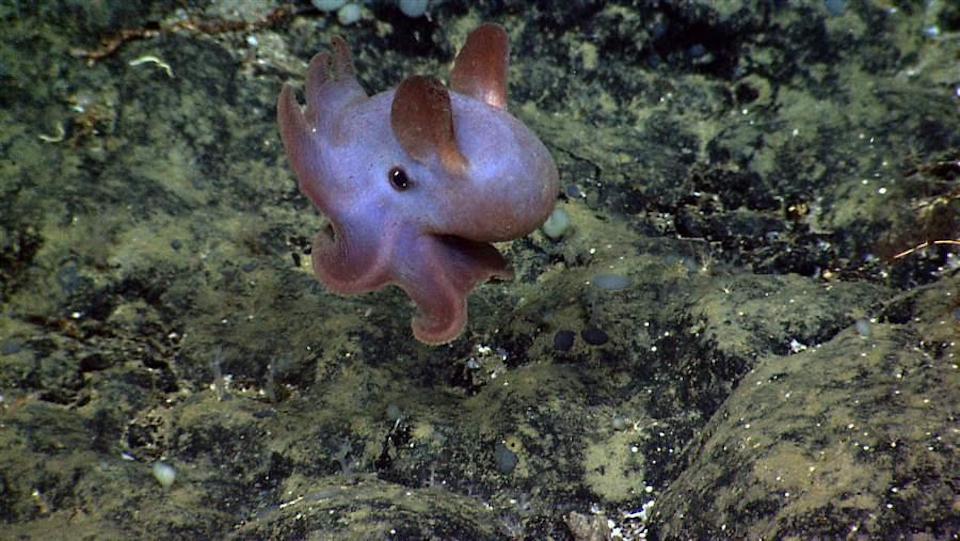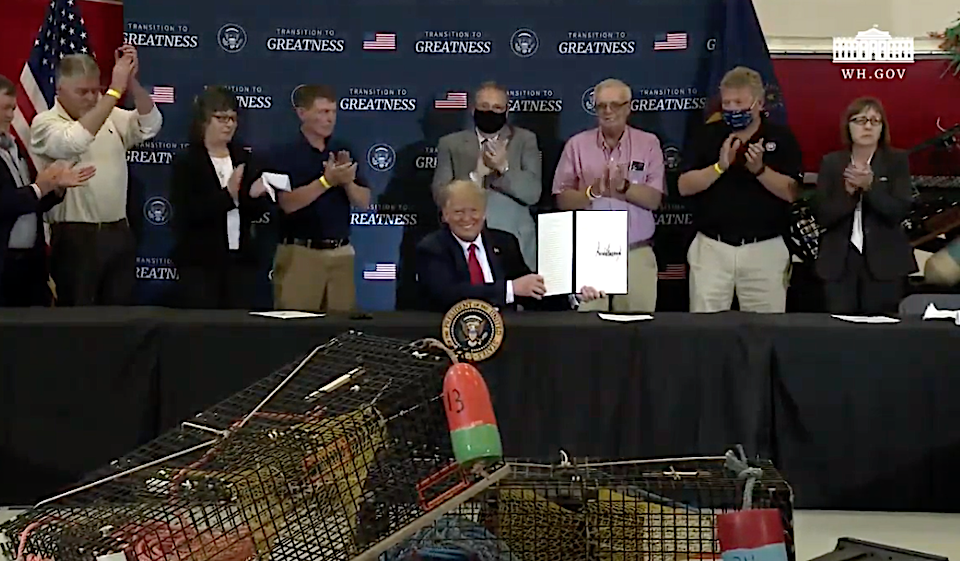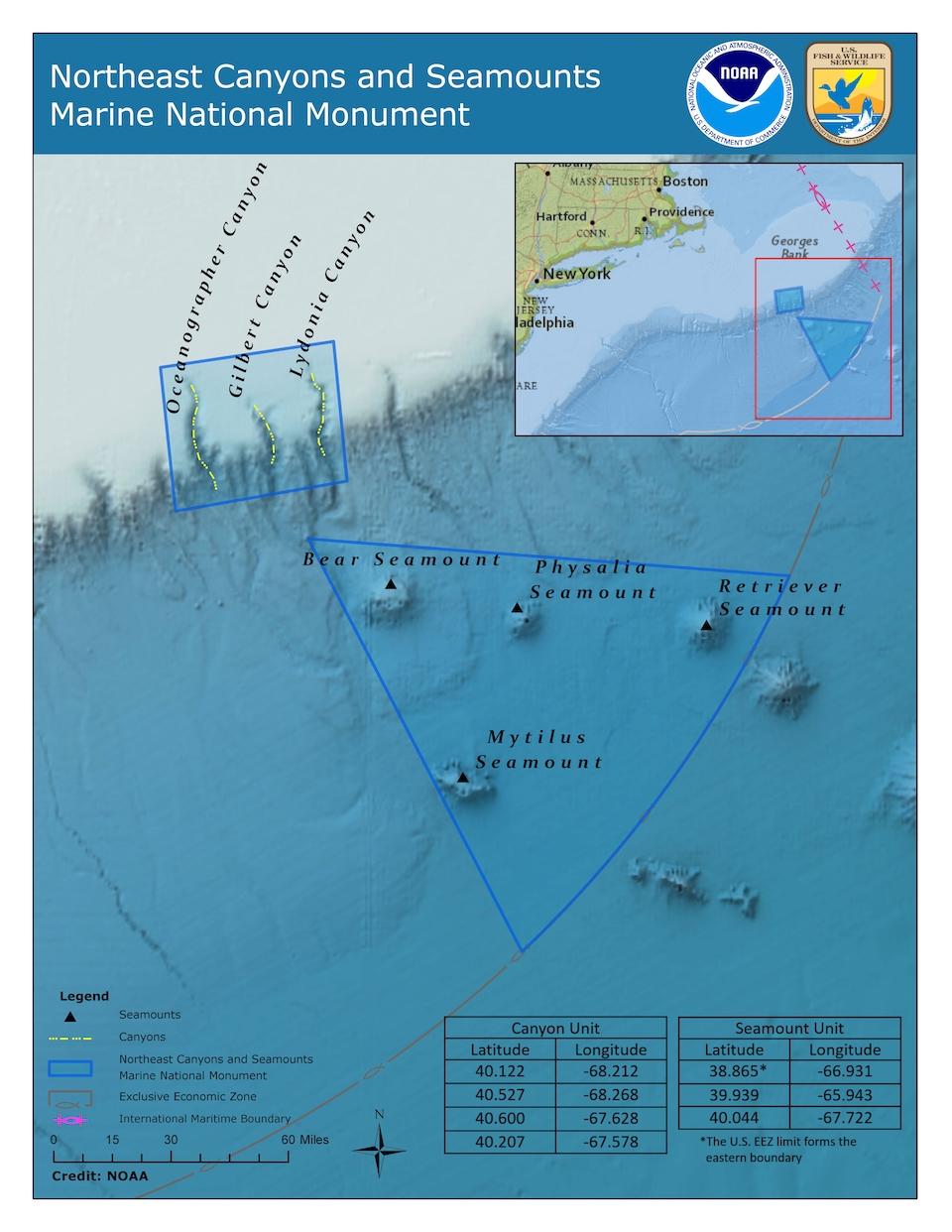
This dumbo octopus was sighted by the NOAA Okeanos Explorer ship during a dive to map the Atlantic Canyons and Seamounts in September 2014/NOAA
Editor's note: This updates with President Trump's appearance in Maine, where he signed a proclamation to open the Northeast Canyons and Seamounts National Monument to fishing.
President Trump went to Bangor, Maine, on Friday to remove a "no fishing sign" from the Northeast Canyons and Seamounts National Monument, a move hailed by the fishing industry but which drew criticisms from environmental organizations and political opponents concerned about his attacks on public lands and the environment.
"He's done Maine a tremendous disservice, I can tell you that. Just from a commonsense standpoint," Trump said of President Obama's move in 2016 to use his authority under The Antiquities Act to designate the monument, which spans nearly 5,000 square miles, an expanse larger than the state of Connecticut. "How could you let a thing like this happen?"
Appearing in a warehouse holding lobster boats and decorated with lobster traps and buoys, the president said the fishing industry had been wronged by the Obama administration and the fisheries arm of the National Oceanic and Atmospheric Administration.
"You've been treated very badly," he told a small gathering of lobstermen, crabbers, and commercial fishing interests before signing a proclamation removing the ban against commercial fishing in the monument. "They've regulated you out of business. And yet you've treated the area like it was your home. I know that."
The industry representatives who attended the event told Trump that they long have been careful not to adversely impact ocean fisheries, pointing out that the area now covered by the monument had been fished for decades before environmental organizations urged Obama to protect the "pristine" area.
"We've been in there for 40 years," one man told the president. "If the environmental groups can deem the place pristine, and we've been operating in that area for 40 years, and you can't find any evidence where we've done any damage, I would say we've been pretty good stewards."

President Trump traveled to Maine on Friday to open up the Northeast Canyons and Seamounts National Monument to fishing.
The national monument encompasses a biologically robust area located about 100 miles southeast of Cape Cod National Seashore. It became the Atlantic Ocean's first national monument when Obama established it.
According to the NOAA Fisheries, the nearly 5,000 square-mile monument "includes two distinct areas, one that covers three canyons and one that covers four seamounts. These undersea canyons and seamounts contain fragile and largely pristine deep marine ecosystems and rich biodiversity, including important deep sea corals, endangered whales and sea turtles, other marine mammals and numerous fish species."
The commercial fishing industry had challenged Obama's designation in court, but the judge ruled that the former president acted within his authority under the Antiquities Act in designating the monument.
When Obama designated the monument, then-Interior Secretary Sally Jewell said the designation would "help protect the unique geology and biodiversity of these important underwater features and wildlife species that cannot be found anywhere else in the world. This critical marine area, which serves as important habitat for pelagic fish species, corals, whales, sea turtles, sea birds and other species, will now be protected and preserved for future generations, serving as an important natural laboratory for research and enhanced understanding of the impacts of climate change on our oceans.”
But in 2017, then-Interior Secretary Ryan Zinke, after a review of national monuments designated by Presidents Clinton, George W. Bush, and Obama, recommended that commercial fishing be allowed in Northeast Canyons and Seamounts National Monument.
The move drew condemnation from a variety of conservation and environmental organizations as well as U.S. Rep. Raúl Grijalva, chair of the House Natural Resources Committee. A Democrat from Arizona, Grijalva long has spoken out against Trump's actions to redraw boundaries around Bears Ears and Grand Staircase-Escalante national monuments in Utah and the president's repeated practice of relaxing environmental regulations.
“There are few words left to describe this president’s disdain for the health and environmental quality of our country. With more than 100,000 Americans dead from coronavirus, more than 40 million out of work and our country facing its greatest economic crisis since the Great Depression, President Trump made the time to weaken our marine habitat protection standards, which says everything that needs to be said," said Grijalva. "He has never shown any respect for our conservation laws, but this week has seen him move to pure recreational destruction mode.
"We’ve seen where his true loyalties lie, and we should expect the same treatment for every standard he or his polluter allies have ever laid eyes on until his time in office is over," the congressman said. "He clearly intends to leave us with a poorer, dirtier country than the one he found when he came to office, and today’s step is another down that unwelcome path.”
At the National Parks Conservation Association, President and CEO Theresa Pierno called the national monument "a living laboratory, providing important scientific data about overfishing, invasive species and climate change, helping to inform management and conservation of the greater ocean ecosystem and our 88 coastal national parks."
"Not only is this place important to iconic national park sites in the Northeast, including Acadia, Cape Cod, and Fire Island National Seashores, Boston Harbor Islands and Gateway National Recreation Areas, but to the future of our planet," added Pierno. "It supports a vibrant marine environment including cod, tuna, sea turtles, sharks, seabirds and endangered marine mammals like North Atlantic right whales."
Lena Moffitt, director of the Sierra Club's our Wild America campaign, said Trump was "slashing protections for one of our country’s most important havens for dying ocean life."
"While Trump should be responding to demands for racial justice and urgent needs to fight the coronavirus pandemic, he is neglecting communities and continuing to push his destructive agenda that will have devastating effects on future generations and the environment,” she added.
Rolling back protections for the monument is another attack on the environment by the president and poses a threat to all national monuments, Jessica Loya, director of policy and programs for GreenLatinos, said Friday.
"An attack on one national monument is an attack on all," she said. "Trump has continued to show disregard for the protection of our environment as he continues to roll back critical protections in place for our natural resources, ecosystems, and wildlife. The designation of a national monument, such as the Northeast Canyons and Seamounts, are not done in a political vacuum but instead in response to the interests and needs of communities to ensure that those places with 'historic landmarks, historic and prehistoric structures, and other objects of historic or scientific interest' are protected for generations to come."

At the National Resources Defense Council, Brad Sewell, the group's senior director of Oceans, said the president was removing some of the monument's protections to allow industry to profit from the resources.
“These fragile, extraordinary ocean areas are full of thousand-year-old corals, endangered whales, and other precious marine life. They belong to all Americans, and they are held in trust for future generations," he said. “A significant change to the monument or its protections — such as allowing commercial fishing — must be done by Congress, not by the president. The Antiquities Act gives the president power to protect special areas for future generations, not the opposite power to abolish those protections. Fishing poses a range of threats, such as harm to deep-sea corals from heavy fishing gear, and entanglement of bycatch and marine mammals."
Sewell said NRDC would take the administration to court to protect the monument's resources if needed.
"Trump’s proclamation is yet again an open invitation for corporate profit-driven entities to take advantage of the American people and critically endangering our environment, and endangering marine life," added Loya.
"Time and again, Trump has forgone the harmful effects of climate change, with little government accountability and oversight and instead prioritized lining the pockets of corporations," she said. "In the midst of this health and economic crisis, Trump has made it his priority to ignore the real issues at hand and push forward with his anti-environmental agenda that will not only affect the people of Maine but will have a trickling negative health and economic impact on frontline communities most impacted by climate change and the pandemic."



Comments
I didn't see Senator Collins in the photo?
She did not attend, as we understand it.
Is there nothing this horrible man-child won't do at the expense of the environment?
Four years of damages to reverse, and a total unknown how many of them are irreversable.
Hunting in Alaska parks, fishing in Maine parks. Roosevelt is turning in his grave.
VOTE VOTE VOTE!
Simple solution! Name all the National Monuments, Parks and Preserves after President Rump, maybe put in a golf course or two! Then maybe he'll go home...
The pattern is consistent. Former Secretary of the Interior Zinke told NPS and other federal lands wildlife professionals to defer to the states on matters of wildlife management and conservation. Bears Ears and Grand Staircase/Escalante were reduced to fragments of their original sizes to please republicans in Utah. Management of Tule elk at Point Reyes is again being sacrificed to appease local partisans. Republicans in Michigan state government came close to forcing hunting on Isle Royale and it was only by sheer luck that the NPS beat them to the punch. In discussions of fishing and boating in Biscayne and Florida Bays, which should be controlled by NPS professionals, the conservation position routinely gets beat up and compromised by republicans who control Florida state government. Control over the regulation of hunting in national park units and other federal lands in Alaska has recently been handed over to republicans in Alaska state government. Now, we see this latest removal of protections from a national monument, one more GOP undoing of national monument protections imposed by America's first black president. And, those are just the examples that immediately come to mind.
On the surface, these childish acts of vandalism in governance might seem to be just republican election year luring of the hook and bullet crowd; but, they're really part of a broader republican preferred approach to governance known as devolution, the term devolution originating as the opposite of evolution. This approach to governance, which is very similar to gerrymandering in both its goals and tactics, has been around for quite a while and republicans find it attractive for a number of unwholesome reasons. Most of those reasons trace their beginnings all the way back to the original maneuvering between northern colonies seeking independence and southern colonies intent on ensuring a continuation of a privileged lifestyle powered by slavery. Often cloaked as states' rights, this approach, like gerrymandering, has been used by republicans to cover, cloak, hide, and facilitate efforts designed to more easily concentrate control into the hands of a privileged group while obstructing or outright denying civil rights, voting rights, equal rights and equal justice to other groups.
While I am as appalled as any other thinking adult by the conservation damage being done, I am actually more worried by the deeper damage being done to fabric of democracy itself by these perpetual republican dirty tricks. By engaging in these fragmenting tactics, by devolving our governance systems, by embracing nihilism and discarding everything America stands for in their quest for unrestrained power; the GOP is weakening the very foundations of our country ...and Putin likes it.
Newspeak at it best